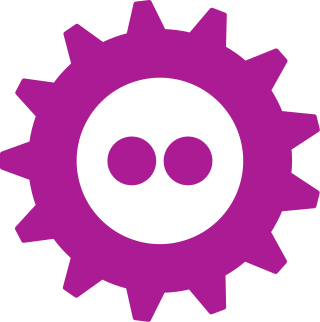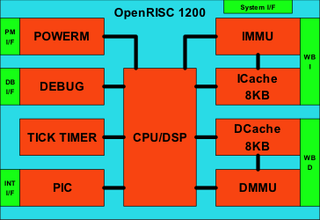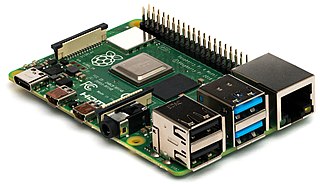
Free software or libre software or libreware is computer software distributed under terms that allow users to run the software for any purpose as well as to study, change, and distribute it and any adapted versions. Free software is a matter of liberty, not price; all users are legally free to do what they want with their copies of a free software regardless of how much is paid to obtain the program. Computer programs are deemed "free" if they give end-users ultimate control over the software and, subsequently, over their devices.
OpenRISC is a project to develop a series of open-source hardware based central processing units (CPUs) on established reduced instruction set computer (RISC) principles. It includes an instruction set architecture (ISA) using an open-source license. It is the original flagship project of the OpenCores community.

OpenCores is a community developing digital open-source hardware through electronic design automation (EDA), with a similar ethos to the free software movement. OpenCores hopes to eliminate redundant design work and significantly reduce development costs. A number of companies have been reported as adopting OpenCores IP in chips, or as adjuncts to EDA tools. OpenCores is also sometimes cited as an example of open source in the electronics hardware community.

Free and Open source Software Developers' European Meeting (FOSDEM) is a non-commercial, volunteer-organized European event centered on free and open-source software development. It is aimed at developers and anyone interested in the free and open-source software movement. It aims to enable developers to meet and to promote the awareness and use of free and open-source software.

Open-source hardware (OSH) consists of physical artifacts of technology designed and offered by the open-design movement. Both free and open-source software (FOSS) and open-source hardware are created by this open-source culture movement and apply a like concept to a variety of components. It is sometimes, thus, referred to as FOSH. The term usually means that information about the hardware is easily discerned so that others can make it – coupling it closely to the maker movement. Hardware design, in addition to the software that drives the hardware, are all released under free/libre terms. The original sharer gains feedback and potentially improvements on the design from the FOSH community. There is now significant evidence that such sharing can drive a high return on investment for the scientific community.
In electronic design, a semiconductor intellectual property core, IP core, or IP block is a reusable unit of logic, cell, or integrated circuit layout design that is the intellectual property of one party. IP cores can be licensed to another party or owned and used by a single party. The term comes from the licensing of the patent or source code copyright that exists in the design. Designers of system on chip (SoC), application-specific integrated circuits (ASIC) and systems of field-programmable gate array (FPGA) logic can use IP cores as building blocks.

NetSurf is an open-source web browser which uses its own layout engine. Its design goal is to be lightweight and portable. NetSurf provides features including tabbed browsing, bookmarks and page thumbnailing.

A free and open-source graphics device driver is a software stack which controls computer-graphics hardware and supports graphics-rendering application programming interfaces (APIs) and is released under a free and open-source software license. Graphics device drivers are written for specific hardware to work within a specific operating system kernel and to support a range of APIs used by applications to access the graphics hardware. They may also control output to the display if the display driver is part of the graphics hardware. Most free and open-source graphics device drivers are developed by the Mesa project. The driver is made up of a compiler, a rendering API, and software which manages access to the graphics hardware.

The Linux Foundation (LF) is a non-profit organization established in 2000 to support Linux development and open-source software projects. In addition to providing a neutral home where Linux kernel development can be protected and accelerated, the LF is dedicated to building sustainable ecosystems around open-source projects to accelerate technology development and commercial adoption.

The OpenRISC 1200 (OR1200) is an implementation of the open source OpenRISC 1000 RISC architecture.

The BeagleBoard is a low-power open-source single-board computer produced by Texas Instruments in association with Digi-Key and Newark element14. The BeagleBoard was also designed with open source software development in mind, and as a way of demonstrating the Texas Instrument's OMAP3530 system-on-a-chip. The board was developed by a small team of engineers as an educational board that could be used in colleges around the world to teach open source hardware and software capabilities. It is also sold to the public under the Creative Commons share-alike license. The board was designed using Cadence OrCAD for schematics and Cadence Allegro for PCB manufacturing; no simulation software was used.

Verilator is a free and open-source software tool which converts Verilog to a cycle-accurate behavioral model in C++ or SystemC. The generated models are cycle-accurate and 2-state; as a consequence, the models typically offer higher performance than the more widely used event-driven simulators, which can model behavior within the clock cycle. Verilator is now used within academic research, open source projects and for commercial semiconductor development. It is part of the growing body of free EDA software.

Linux-libre is a modified version of the Linux kernel that contains no binary blobs, obfuscated code, or code released under proprietary licenses. In the Linux kernel, they are mostly used for proprietary firmware images. While generally redistributable, binary blobs do not give the user the freedom to audit, modify, or, consequently, redistribute their modified versions. The GNU Project keeps Linux-libre in synchronization with the mainline Linux kernel.

Raspberry Pi is a series of small single-board computers (SBCs) developed in the United Kingdom by the Raspberry Pi Foundation in association with Broadcom. The Raspberry Pi project originally leaned toward the promotion of teaching basic computer science in schools. The original model became more popular than anticipated, selling outside its target market for uses such as robotics. It is widely used in many areas, such as for weather monitoring, because of its low cost, modularity, and open design. It is typically used by computer and electronic hobbyists, due to its adoption of the HDMI and USB standards.
OVPsim is a multiprocessor platform emulator used to run unchanged production binaries of the target hardware. It has public APIs allowing users to create their own processor, peripheral and platform models. Various models are available as open source. OVPsim is a key component of the Open Virtual Platforms initiative (OVP), an organization created to promote the use of open virtual platforms for embedded software development. OVPsim requires OVP registration to download.
The OpenPOWER Foundation is a collaboration around Power ISA-based products initiated by IBM and announced as the "OpenPOWER Consortium" on August 6, 2013. IBM is opening up technology surrounding their Power Architecture offerings, such as processor specifications, firmware and software with a liberal license, and will be using a collaborative development model with their partners.
RISC-V is an open standard instruction set architecture (ISA) based on established reduced instruction set computer (RISC) principles. Unlike most other ISA designs, RISC-V is provided under royalty-free open-source licenses. A number of companies are offering or have announced RISC-V hardware; open source operating systems with RISC-V support are available, and the instruction set is supported in several popular software toolchains.
lowRISC C.I.C. is a not-for-profit company headquartered in Cambridge, UK. It uses collaborative engineering to develop and maintain open source silicon designs and tools. lowRISC is active in RISC-V-related open source hardware and software development and stewards the OpenTitan project.
Libre-SOC is a libre soft processor core originally written by Luke Leighton and other contributors, announced at the OpenPOWER Summit NA 2020. It adheres to the Power ISA 3.0 instruction set and can be run on FPGA boards, currently booting MicroPython and other bare-metal applications.











